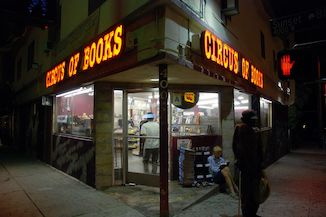|
|
Movie Review: Circus of BooksBy Matthew HuntleyMay 5, 2020
I’ll let Karen and Barry fill you in on the specifics, but a few years into their marriage they fell upon hard financial times and Karen used her leverage with Larry Flynt to distribute porn magazines to generate extra income. This eventually led them to Circus of Books, originally called Book Circus, and in 1982, the couple assumed ownership of the West Hollywood business and opened a second location in Silver Lake. For years, no one close to them—not their parents, kids, friends, other worshipers at their synagogue—had any clue how they made their living. However, once the cat was out of the bag, the Masons began to see (and continue to see) the extensive role Circus of Books and its unique culture played in their lives, both as individuals and as a family unit. This becomes an important theme and useful takeaway from “Circus of Books”: the jobs we perform day in and day out not only influence our own points of view, the decisions we make, the biases we carry, the struggles we strive to overcome, but also those of our families, friends, co-workers. Essentially, our jobs are never our own. As I mentioned, it would be unfair to reveal too much about the history of Circus of Books or the testimonies that come from Karen, Barry, Rachel, and Rachel’s brothers, Micah and Josh, not to mention the store’s various former employees and patrons, including LGBT Rights activists Alexei Romanoff. Everyone Rachel interviews brings an amusing, thoughtful and often heartrending insight to the table and it’s best not to know about them beforehand. What I can say is that Mason and her co-writer and editor, Kathryn Robson, find a near-perfect balance of humor, drama, talking heads, walking bodies, old news footage, and emotional reaction shots that turn “Circus of Books” into a genuinely engrossing experience. It has a universal appeal not only because it’s educational but also because it feels so nostalgic in the way it gets us to recollect our own families and upbringings. At the same time, it targets and deflates the stigmas often associated with sex, pornography, and homosexuality, and even though it’s clearly a liberal, left-leaning film, it’s not overly pushy. Mason has crafted it in such a way that we’re able to see gay porn (and those who patronize and make it, including Karen and Barry themselves at one point) objectively as a legitimate industry. Whether or not you agree that gay porn should be allowed to exist in the first place, “Circus of Books” shows us how it functions like any other business, and it’s inherently interesting. More importantly, though, the film encourages us not to make assumptions about people or places, be they good or bad. It reminds us each possesses its own unique history, one that’s impossible to fully know, although we can bet it’s a mix of the silly, serious, light, dark, humorous and sad, and just as “Circus of Books” shows, has the potential to be thoroughly entertaining.
|

|
|
|

|
Thursday, October 31, 2024
© 2024 Box Office Prophets, a division of One Of Us, Inc.


